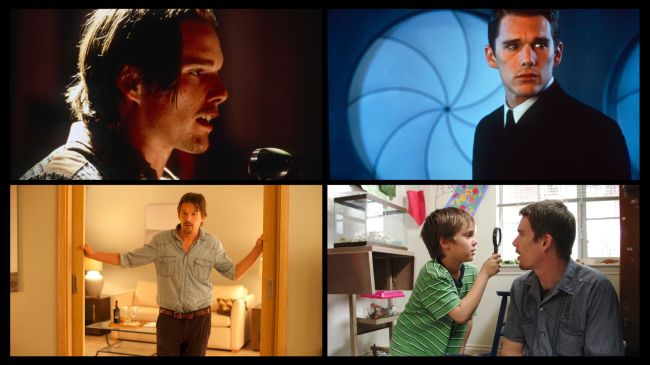One of Ethan Hawke’s greatest attributes as an actor is that he makes things look easy. That’s not to say that the star doesn’t put the work in — you don’t get Emmy and Tony nominations, write several books, and direct your own films when you’re just coasting.
But since his emergence as a movie star in the ’90s, the Austin-born actor has always had a laidback, easygoing vibe that’s made his movie star swagger seem effortless and allowed him to sink convincingly into most every part he’s ever taken. That attitude made him something of a Gen X icon in his day, when he starred in films like “Reality Bites” and “Before Sunrise.” As he’s gotten older, he hasn’t lost that sense of cool, but has brought it to older, wiser, and more seasoned characters, like the hip if immature father he brought to life in “Boyhood.” And, when Hawke departs from those types with roles he doesn’t seem an obvious fit for, he shows that he’s more than capable of shedding that image for something more severe, like with his transformative and stunning work in Paul Schrader’s “First Reformed.”
Breaking through with 1989’s “Dead Poets Society,” Hawke has also shown himself to have great taste in film roles, constantly choosing interesting projects that have kept him fairly prominent throughout his decades in Hollywood. His most consistent collaborator is Richard Linklater, with whom he first worked with for “Before Sunrise,” eventually co-writing the sequels to the film alongside his co-star Julie Delpy. He also worked with him on “Boyhood,” gaining much acclaim for his performance in the time-hopping coming-of-age drama. Through his career, he’s starred in great films, co-wrote quite a few of them, and even directed a few of his own, including “Chelsea Walls,” “The Hottest State,” and the HBO Max documentary series “The Last Movie Stars.” And he’s shown that his star power can translate to TV, where’s he’s given great performances in series like “Moon Knight” and especially “The Good Lord Bird.”
With Hawke starring in the new TV series “The Lowdown,” IndieWire has taken the liberty of going through his filmography to rank the best of his greatest performances. This list includes both movie roles and the rare TV appearance, including his work on “The Good Lord Bird” and “Reservation Dogs.” Read on for Ethan Hawke’s 10 best performances, ranked.
“Reality Bites” (1994)
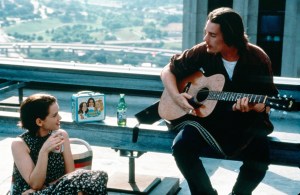
Image Credit: ©Universal/Courtesy Everett Collection
A defining text of mid-’90s Gen X disenchantment, “Reality Bites” is not a particularly good movie: the characters are shrill and unlikable, the plot is preachy and basic, and Helen Childress’ script has a smug, too-cool-for-school attitude that’s aged horrendously after 30 years. Hawke doesn’t necessarily escape the film’s problems: his character, coffeehouse singer-songwriter Troy, is a thin stereotype of a hot ’90s slacker, wildly unlikable despite the film wanting you to fall for him. That said, this is arguably the project that did the most to cement Hawke’s star image, and there’s undeniably appeal to his soulful, snarky performance, which shows real star quality that’s downright nostalgic to see in a Hollywood production these days. His chemistry with Winona Ryder is almost enough to make their characters’ romance work, even if the script keeps getting in the way.
“Born to Be Blue” (2015)
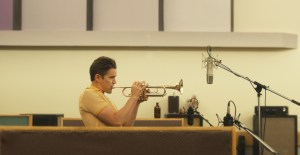
Image Credit: ©IFC Films/Courtesy Everett Collection
An underseen gem, “Born to Be Blue” presents a semi-fictionalized look at the life of famed jazz trumpeter Chet Baker, focusing particularly on his recovery from a mugging incident in the ’60s that lead to the destruction of his teeth and damaged his ability to play his beloved instrument. Hawke nearly played a younger version of Baker in a Richard Linklater film that never came to fruition; his performance in Robert Budreau’s film is better for the experience and vulnerability he brings to the role with his age, despite his underlying boyish charm. Hawke learned to play the trumpet himself for the role, his inexperience with the instrument working with the context of Baker trying to recover from his accident, and nails a warbling, sensitive performance of the song “I’ve Never Been in Love Before.” The film doesn’t sugercoat any of Baker’s faults, from his neediness to his general immaturity, but Hawke is raw and sensitive enough that you want to forgive him all the same.
“Gattaca” (1997)
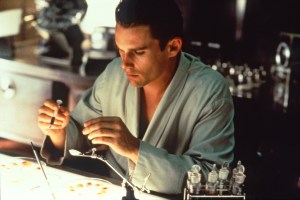
Image Credit: ©Columbia Pictures/Courtesy Everett Collection
One of Hawke’s most well-remembered films from the ’90s, thanks in part to becoming a lazy day in high school science class staple watch, “Gattaca” is also an intelligent and thoughtful warning of the potential impact of eugenics, imagining a future where parents use genetic selection to conceive their children. For Hawke’s Vincent Freeman, who was born without any genetic selection, that means a lifetime of discrimination, getting barred from high-paying work and his dreams of going to space being denied. But he gets a chance at a new life when he begins impersonating Jude Law’s Jerome Morrow, a swim champion who was paralyzed in an accident. In an often chilly sci-fi film, the earthy Hawke is excellent casting: he’s certainly attractive, but almost seems of an entirely different era than the unnaturally beautiful Law, with a wide-eyed sense of wonder that sells Vincent’s very earnest dreams. Also, the set of the film is where Hawke met his former wife Uma Thurman, and the two share unsurprisingly great chemistry that gives the film’s romance real charge.
“Dead Poets Society” (1989)
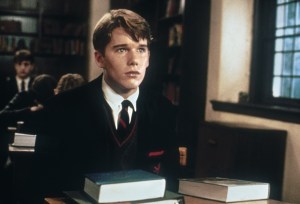
Image Credit: ©Buena Vista Pictures/Courtesy Everett Collection
Hawke was just 18 years old when he broke through as the sweet, sensitive Todd in “Dead Poets Society,” Peter Weir’s beloved coming-of-age drama about Robin Williams’ John Keating, who inspires a group of dissatisfied boarding school boys to “seize the day” and pursue their passions. At his then-young age, the actor has much of the sensitivity that would make him a great performer later on his career, proving very believable as a shy, sheltered teen with low confidence who slowly emerges from his shell. Most importantly, he has excellent chemistry with Robert Sean Leonard as Todd’s best friend Neil, developing a sweet friendship that makes the film’s ultimate tragedy all the more painful. In an earnest, inspirational tearjerker, it’s Hawke’s performance that gives the story much of its emotional core.
“Reservation Dogs” (2023)
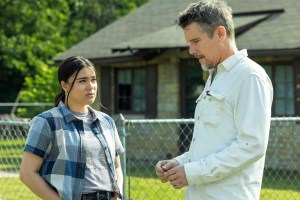
Image Credit: ©FX Networks/Courtesy Everett Collection
“Reservation Dogs” is an incredible show for many reasons, with some of the best writing, direction, and acting of any series this decade. One of its greatest attributes, though, is its ability to expand beyond its central cast of four Native teens living on an Oklahoma reservation and flesh out the community around them, leading to a sprawling ensemble where every player has texture and humanity. For its penultimate episode, the show was even able to flex a bit by abandoning nearly the entire cast for a standalone story focusing on Elora (the phenomenal Devery Jacobs) as she locates the father she never met for financial information. Casting a movie star like Hawke in the role could feel like stunt casting, but it never feels like it watching “Elora’s Dad”; he sinks into the lowkey, bittersweet tone of the show immediately, never overplaying the emotions that come from this reluctant reconnection. He’s excellent with Jacobs in particular, his regretful sweetness contrasting beautifully with her spiky disposition, and making for one of a great show’s very best episodes. It’s an excellent preview of what Hawke and series creator Sterlin Harjo could accomplish in their followup collaboration “The Lowdown.”
“Hamlet” (2000)
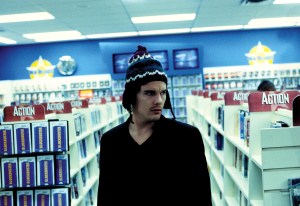
Image Credit: ©Miramax/Courtesy Everett Collection
Divisive at the time, and still today, Michael Almereyda’s 2000 contemporary version of “Hamlet” is nonetheless one of the most interesting Shakespeare films ever made, transforming the classical tragedy into a paranoia-drenched sort of techno thriller about the evolving technology of the time and the feeling of being constantly under surveillance. Hawke’s performance was also a bit divisive, rendering the Prince of Denmark as a mopey-eyed film student and heir to a major corporation, with many critics preferring the rest of the ensemble (most notably Julia Stiles’ devastating Ophelia or Kyle MacLachlan’s scheming Claudius). But his performance, which emphasizes the more pathetic parts of the Prince’s nature, works well in this film’s feverish context, sucking out the grandiosity of the character in favor of something petulant and infantile. It’s not what you think of when you think of Shakespearean acting, but in a way, it’s more honest and insightful about the character than many other renditions you’ve seen before. And when the film asks him to, Hawke delivers, with a sensitivity that makes Hamlet unmistakably human.
“Boyhood” (2014)
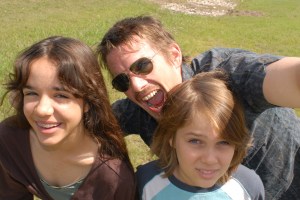
Image Credit: ©IFC Films/Courtesy Everett Collection
Famously filmed over the course of 11 years with production starting and stopping to track the coming-of-age of its main character, Richard Linklater’s “Boyhood” derives a lot of pleasure from seeing how its ensemble of actors evolves over the years. Nowhere is that more evident than with Ethan Hawke’s performance as Mason’s (Ellar Coltrane) irresponsible, reckless father, semi-estranged from his kids at first after his divorce from their mother. Hawke was 32 with two very young kids of his own when production began; by the time it ended in 2013, he was in his forties, and the experience of raising his own children (and going through his own divorce) clearly seeped into the extra level of tenderness and sweetness he brought to the role. In a poignant film about the passage of time, watching Hawke transform his character from a wash-up to someone Mason can be proud to call his father makes for the most satisfying, moving arc.
“The Good Lord Bird” (2020)
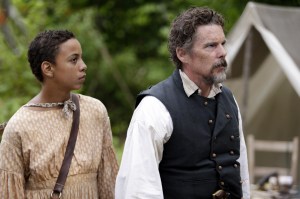
Image Credit: ©Showtime Networks Inc./Courtesy Everett Collection
Criminally underseen and underappreciated, “The Good Lord Bird” features Hawke playing an undersung American hero, abolitionist John Brown, who raided federal armories in an attempt to begin a slave revolt. Told from the point of view of Onion (Joshua Caleb Johnson), a fictional enslaved boy who joins Brown’s soldiers, the show follows Brown’s life with plenty of reverence, which could slide into hero-worshipping. But Hawke nails a tricky, difficult part: his Brown is bombastic and theatrical, prone to launching into sermons and speeches at a moment’s notice, but with real conviction and purpose behind everything he says, and the actor never winks to the audience or undercuts the real sincere humanity behind Brown’s beliefs. It’s an astonishingly ferocious portrait of revolutionary fire packed with adrenaline.
“Before” Trilogy (1995, 2004, 2013)
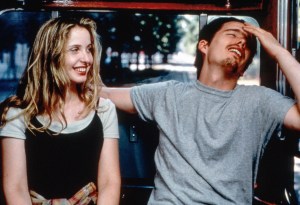
Image Credit: © Columbia /Courtesy Everett Collection
Nothing about the “Before” trilogy of films, Richard Linklater’s opus about an American man and a French woman who meet by chance on a train and their two-decade-ish love story, would work if the stars didn’t have the type of lightning-in-a-bottle chemistry casting directors dream of. It took the director nine months to finalize casting for the characters of Jesse and Céline for “Before Sunrise,” before he eventually got Hawke and Julie Delpy together for a final reading. In the film that resulted, the two have such a swoony, instant spark that you can understand exactly why they would fall for each other immediately, and both have a perfect handle on the bantering, erudite, circular dialogue that the movie is built upon. Over two sequels, the characters’ relationship got to grow more complicated, and it’s a joy to see the actors’ grow with their characters. Hawke, deep in his dreamy Gen X heartthrob era in the first film, manages to keep the traits that make Jesse unique — his swagger, intelligence, playfulness — while also showing his evolution from immature young man to older, flawed husband. And when Hawke smashes the big blowout fight between Jesse and Céline that “Before Midnight” builds up to out of the park, you get the sense that his younger self from the first film wouldn’t have been capable of delivering it.
“First Reformed” (2017)
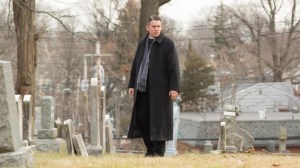
Image Credit: Everett Collection / Everett Collection
Hawke, remarkably, was not Oscar-nominated for his performance in “First Reformed,” his finest work as an actor. Had Paul Schrader’s morally murky psychological thriller received more critical attention, he very well could have (and probably should have) won. He’s that great as Reverend Ernst Toller, the minister of a small historical church in Upstate New York whose worldview is shaken when he provides spiritual council to a radical environmentalist and his pregnant wife. With a deep set brow of worry and stiff body posture, Hawke ably conveys the image of a man haunted by his past actions and with deep convictions for how to repent. With Toller such an internal character, we chart most of his change not through words or actions, but through Hawke’s face, how his eyes flash with shock, doubt, anger, and disgust. When Toller makes his final choice at the end of the film, it’s thanks to Hawke’s work that it’s not shocking at all. Few actors have been capable of a performance as spiritually distraught as this.

